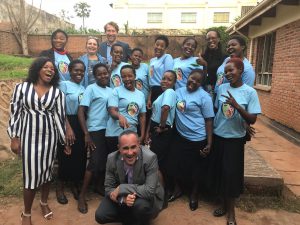LGT and m2m: “Progress, not the Status Quo”

Tom Kagerer, Investment Director at LGT VP Photographer: Eddy Risch, Schaan
In the wake of the news that LGT Venture Philanthropy (LGT VP) has invested $1M into mothers2mothers (m2m), we sat down with Tom Kagerer, Investment Director at LGT VP, to discuss their recent engagement.
m2m: Tom, thanks for taking time to chat to us. We are thrilled to be receiving this investment. What made you choose m2m for one of LGT VP’s largest ever grants to an organisation?
Tom Kagerer (TK): We are looking for organisations with scalable models that directly impact several of the UN’s Sustainable Development Goals (SDGs). m2m’s broad health intervention contributes to seven of the 17 SDGs, in particular those relating to good health and gender equality. Another aspect that excites us is the high cost-benefit ratio of organisations such as m2m. The World Health Organization documented a 10:1 return on investment from investing in community-based health interventions through increased productivity, reduced risk of epidemics, and the economic impact of increased employment. [1]
It is core to LGT VP’s DNA to fund significant progress through strengthening organisational growth—we are confident that this new grant will deliver exactly that. We have known m2m for a decade now, and through that time, m2m has innovated and built on its very successful model, all the while maintaining quality in delivery and cost-effectiveness. We have been particularly impressed with how m2m has delivered impact through strong relationships with governments, with the Mentor Mother Model even adopted as national policy in several countries. In addition, we have seen how your model of having health workers based both in facilities and in surrounding communities creates strong bonds between people and the health facilities that serve them, leading to better health outcomes.
All of this has led to remarkable impacts—such as m2m helping to eliminate paediatric AIDS among its clients and ensuring that 97% of children in Early Childhood Development programmes reach all their developmental milestones at 12 months. These results demonstrate what m2m is capable of, and we want to help the organisation go even further, even faster.
m2m: You mention that LGT VP has known m2m for ten years. Why have you chosen to make this grant now?
TK: It is a combination of both internal and external factors. Internally, LGT VP has taken a strategic decision to deepen our commitment to a small number of trusted partners. We want to support organisations that have an effective, innovative, and scalable model that improves lives for the less-fortunate—making m2m a perfect fit. Of course, the length of our partnership, and how consistently m2m has delivered, was an important factor. Externally, we heard—loud and clear—last year’s warning by the International AIDS Society that a “dangerous complacency” was creeping into the HIV/AIDS response. We wanted to respond to this, and m2m’s model of going beyond a narrow focus on HIV alone is aligned to accepted best practice.

Tom Kagerer (back row) visiting the m2m site at Bwaila Hospital in Lilongwe, Malawi, earlier this year.
m2m: How important was it to you that m2m employs Mentor Mothers, rather than relying on the volunteer model some other organisations employ?
TK: In a word, essential. There are a handful of organisations out there that can deliver transformative health impacts, but m2m is unique in that it does this while providing meaningful work for thousands of women living with HIV. For us, m2m’s model means double the impact through one engagement.
m2m: Part of the grant is earmarked for our work in Malawi specifically. Can you tell us more about that?
TK: In Malawi, the community health system faces resource constraints and inconsistencies around quality of service—which negatively affects health outcomes for Malawians. Recognising the importance of community health and the opportunity to address these challenges, the Ministry of Health (MoH) has developed the country’s first National Community Health Strategy (NCHS) for the period of 2017-2022. With m2m being an implementation partner to the MoH since 2008, our funding supports m2m’s efforts to strengthen its partnership on a national level to become an instrumental operator and advisor in rolling out NCHS across Malawi. Having seen m2m’s work in Malawi as part of our due diligence trip, I have witnessed the great work in the communities as well as the trusted relationship m2m has built up over the years with health officials at the highest regional level. I can’t wait to go back and see further progress soon!
m2m: What happens now? How will LGT VP continue to work with m2m?
TK: We will continue to be an active partner to m2m, and this will take many forms. We will engage with the Senior Management Team and in governance, so we will be involved at the very highest level. In addition, we are arranging for the organisation to host two “LGT Impact Fellows”— experienced professionals that we introduce to our portfolio organisations to spend a year with them working on specific organisational capacity building areas. In the last 10 years, the programme has connected over 150 professionals from over 30 nationalities to our portfolio, including eight into m2m. We are also providing advice and making connections wherever we can—whether that is introducing m2m to our other portfolio organisations for peer-to-peer learning, or using our marketing channels to spread m2m’s successes.
[1] http://www.who.int/hrh/news/2015/CHW-Financing-FINAL-July-15-2015.pdf






















